- Home
- Giles Foden
Zanzibar
Zanzibar Read online
GILES FODEN
Zanzibar
For Tilly
… nor could his eye not ken
Th’ empire of Negus to his utmost port
Ercoco and the less Maritine kings
Mombaza, and Quiloa, and Melind,
And Sofala thought Ophir…
JOHN NILTON, Paradise Lost (1667)
Author’s Note
This novel was, largely, written before the attacks on America of September 11, 2001. On that day, the Southern District Court of New York had not yet concluded its consideration of the events of 1998 upon which the story is based.
A small portion of this material appeared in Arena magazine in 1999. Another piece of work in progress was included in The Weekenders anthology (Random House, 2001).
Contents
Title Page
Dedication
Epigraph
Author’s Note
Part One
1
2
3
4
5
6
7
8
9
10
11
Part Two
12
13
14
15
16
17
18
19
20
21
22
Part Three
23
24
25
26
27
28
29
30
31
32
33
Acknowledgements
About the Author
Copyright
PART ONE
1
As the light broke, she stretched her hungry limbs after the night, entreating it for a mate. What the fugitive dark provided was a monstrous tree. It embraced mother earth in its branches, making her writhe in joy and pain. They struggled for mastery. After a vast lapse of time, it seemed the tree had won. When the goddess was released, however, it was the tree that gave birth. Green shoots issued from its gnarly roots. Birds squeezed out through cracks in its trunk and flew away. Animals, too, it spawned. The first of these – and the most esteemed by man and woman when they themselves emerged – was the turtle.
Some students of the Swahili creation myth say that all this happened on the island of Zanzibar. On the eastern seaboard of Africa, it is a place known for the tranquillity of its harbours, the sweetness of its fruit, and the scent of its spices. Other scholars, especially those from the neighbouring island of Pemba, maintain it was there, in fact, that the Tree of Life pushed down its roots and gave birth to the great turtles of the Indian Ocean.
The turtles are so rare today that many believe they are ghosts. But the ghosts of Zanzibar and Pemba live not in thalassia, or any other pavilion of the ocean. They live in the fragrant orchards of clove and ylang-ylang that cover the islands like a shroud. It is through these that nightly predations are said to be made by the papabawa, the islands’ legendary pale-skinned vampire.
People say the papabawa is just a race memory of the slave trade. No one who has actually seen one of the great turtles, in any case, would call it a ghost. Khaled al-Khidr saw one on February 15, that year’s Night of Power, when the Koran descended in its entirety into the soul of the Prophet. They should have been observing that holiest of occasions, not lying about on the beach.
It was 1996 – the year of his twenty-first birthday. There was a full moon, the time when the turtle laid her eggs, and he was with his friends Ali and Juba. They were camping out on an islet a few miles off the main island, a place his father patrolled from time to time on behalf of its new owner.
They were dozing on the beach in front of a bonfire. All members of a soccer team back on Pemba, they had spent the afternoon on the sand – practising penalties, shooting the ball between two fronds of leaf that made for a goal, or just kicking it around between the three of them. Now it was dark and they were tired. Normally they listened to music at night on these trips, but the batteries on Khaled’s radio had run out.
The moon was shining brightly, its grey light mixing with the yellow of the fire. Khaled had just drunk a can of coke. Ali was chewing gum. Juba had been smoking – a fat roll of leaf that kept going out in the wind. He had been seized by a fit of coughing, and Khaled thought it was him again, but it wasn’t. It was a deeper, stranger sound. There was another noise too, like digging.
They exchanged glances in the firelight, then jumped to their feet and ran in the direction of the sound. A strong wind was whipping the palm trees, but it was easy to tell where the noise was coming from – even for Juba, who was still deep in the thrall of dagga, as marijuana is known in Swahili.
The turtle was enormous, easily seven feet long. The dome of her shell rose at least four feet high. She was digging a hole. The repetitive, wheezy cough came with the effort of it, accompanying each thump of her back flippers as they sprayed out sand behind her. Her front flippers were pushed out like levers, to give her purchase; the whole manoeuvre was perfectly achieved. They watched in awe, their figures casting shadows on the moonlit beach.
Once the hole had been dug, she started making another noise, more high-pitched, a sighing. With the culmination of each sigh, a glistening white egg dropped in the hole. Almost an hour passed, during which more than a hundred appeared, each about the size of a golf ball. Khaled lost count, gazing at every one as it fell.
When the hole was full, the turtle moved forwards a little and began shovelling sand back over the eggs, untroubled by the watching young men. Her glaucous eyes seemed to look straight through them, unseeing. Khaled saw oblivion there, a supreme indifference to everything except that universal law which bids all living things to eat and be eaten in their turn.
After the eggs were covered, they thought it was finished. But then the oddest thing of all happened. The turtle began executing a circle above the nest, pushing herself with each flipper in turn. Around she went, three times. When she finally shuffled away from the nesting ground, the sand was almost completely level. It would be hard for a predator to tell – at least by sight – where she had laid her treasure.
Under that bright full moon, with the sound of rustling palm trees and the rolling breakers all around, the three watched as the turtle progressed, heaving, down the beach. She paused for a moment in the surf and disappeared.
It was the following morning that Khaled al-Khidr, returning home, found his mother and father lying side by side on the floor of their living room. They looked as if they had been placed there deliberately, both of their arms extended above their heads. Across the throat of each was an abrupt, reversing stroke, like a Z on its side.
He tried to scream, but no sound issued. Gasping in anguish, feeling as if the earth itself were shaking, he reached out a hand to steady himself, gripping the back of a chair. He forced himself to breathe, to look, to approach. The edges of each slash were encrusted with dried blood, as were his parents’ shoulders. There were rubbery clots of it covering the mat upon which they lay.
For a few, shocked seconds, staring at the clots, he swayed. His mind wanted to shriek out again, but his voice once more disobeyed, offering only a horrified murmuring that, mounting upwards in the suffocating air, filling his throat and nostrils, choked his being with a sound of new-hatched evil. Unable to bear it, he fell, his legs buckling beneath him.
2
Queller’s clock radio exploded into song. The time was 7 a. m., but he’d been awake already for half an hour. The numbers were pulsing, lime-green LED, and the speaker was belting out a jingle based on the letters WMVY. The date was April 1, 1997. The place was what he called his ‘log cabin’. In t
ruth it was far more luxurious, a pleasant wooden home on the island of Aquinnah, in Martha’s Vineyard, off Cape Cod.
He reached over, sipped some water, swallowed it, then took a big swig. He swilled the water round in his mouth, then let it drop back into the glass. Why was it that however hard he scoured his teeth before going to bed, he woke up feeling as if two hundred elephants, six hundred camels and at least a thousand mules had camped in his mouth while he slept?
He lay back down, head thumping, knowing too well the reason: Scotch, the enemy he’d put in his mouth each night since she’d died, hoping it would be a friend. Glass after glass, night after night … he was bored by his own addiction now, but it continued to keep him in its grasp.
April 1, well … Lucy always used to play a trick on him. He lay staring at the ceiling, happy at the memory, sad at the loss. As he lay there, fixating on the curious duality that is death in life, the newscaster ran down the headlines. Queller wondered if they’d slip in a bogus story. Sometimes they did that.
Fools’ day – he would know this – was named when the Muslims of Granada were tricked into leaving the besieged city. The forces of Spain’s King Ferdinand promised them safe passage if they disarmed, then massacred them on the quayside. Men and women, adults and children, some forty thousand, were all put to the sword. The Spaniards made no distinctions in the application of their cruelty.
In many ways, he thought, the Muslim armies of that time showed greater clemency than the Christian ones, even sparing vegetation. The Koran said: When you fight the battles of the Lord, destroy no palm trees, nor burn any fields of grain. Cut down no fruit trees.
April 1, 1492, was the date of the massacre – the same year Columbus sailed for America. It certainly made one think twice about practical jokes. Queller shut his ears to the voice of the WMVY newscaster. After over half a millennium what happened in Granada was hardly acknowledged as a fact, never mind an outrage. How rarely, he thought, justice overtook the crimes it was supposed to pursue, as it strolled down history’s corridors. It was no wonder that many Islamic nations felt they had been violated by the West, no wonder that a strong madness tugged at the carefully woven threads of diplomacy. The US had broken nearly every treaty it had ever made with Arab countries.
The radio noise was persistent. As he lay, still staring at the ceiling, he learned that the Senate was going to ratify the chemical weapons convention, and that an Arkansas judge had thrown out a sexual harassment case against the President. Currently on a trip to Africa, Clinton had celebrated by playing a tribal drum and telling reporters that he was looking forward to going home and ‘continuing the very ambitious agenda we’ve got there’.
Despairing, Queller rolled over on his stump, flailing at the radio’s square white box with his remaining arm. He thought he’d hit the button, but the damn thing persevered. ‘In other news this week, the President issued a memorandum prohibiting the use of federal funds for human cloning. He urged leaders of the scientific and medical community to adopt a voluntary moratorium on the subject.’
‘But can we trust our leaders?’ demanded a Catholic activist in the discussion afterwards. No, Queller growled, lifting thick, old man’s fingers to hit the button again and switch it off successfully. Especially not that leader. He’d heard an account of another presidential liaison, involving an intern, that journalists were only just beginning to sniff round. His source was a secret service friend whose responsibilities included protection of the Oval Office.
Queller shook his grey head, trying to rid himself of the lurid image which his friend had described. He pondered the last time when he himself had had sexual relations with a woman. His wife. But lovemaking, like much happiness, occupies an elusive place in the structure of memory. Sometimes he could hardly summon her back. Lucy’s face and body, the way she moved and spoke, drifted out of focus.
When it dissolved, that mental phantom, the pain was one of physical separation, like the reed cut from the reed bed in Rumi’s poem. What came instead, sharply defined, was a sharded remembrance of another affliction, some fragment of what felt like a previous life, even though it had happened only eight years ago.
He did not need to look at the stump. The mere breath of memory stirred old fear in his veins. The bullet had taken off his elbow joint, leaving the forearm attached by very little. He’d been knocked down, body and blood tumbling together. He remembered stones, not much earth.
How was it, then, for Queller? After the fall, after the red spray? He’d taken one look – askance, through the distance of shock – and come to his senses. Attention was vital. He gripped the flesh above the wound, anxious to stop the flow. The pain – remembered now, across time, across borders – hit him. He uttered a series of sharp cries.
He laughed. Mr Sam, as he was known then (though he had many names), just laughed, getting back into his four-by-four. Others followed suit, the remainder climbing onto the running-boards, guns at the ready. They moved off up the rocky track. Most were wahhabi, Arab fighters. Some were local mujahidin. The Arabs wore black turbans, the Afghans caps of rough brown wool.
Queller was left clutching his arm. The four Green Berets sat on the ground around him, as they had been ordered. It was all just a moment, but it broke down endlessly: him applying pressure to the bleeding, the soldiers in a circle, their guns piled in the middle, their frightened faces …
Green Berets don’t always wear green berets. It’s a fact. His companions were hooded, faces striped with camouflage cream: mottled blues and greys. There is a way to apply it, rubbing scree and boulders into a face until you achieve the same effect as the ‘disruptive pattern material’ of your mountain uniform.
Waves of agony throbbed through him, his companions’ variegated faces flashing before his eyes. Above them, the sun was rising. A hot bar of iron, dragged up from behind snowy peaks, it might as well have been a cauterising tool applied to his wound. Pain is a vector, all the world and time collapsing to a bunch of nerves. He groaned and whimpered.
To stop these noises, he bit on his collar. It tasted of salt. Beside him, the lieutenant was cursing. None of them, not Queller, not the four soldiers, dared move until the convoy of mujahidin, numbering about fifty, had vanished into the mountain. There was too much risk the Arabs would kill them all. The cold seeping up through their haunches as they sat on the ground, the Americans watched the convoy move up a gulch in the morning sun.
Once it was safely out of sight, the lieutenant called in a chopper on his radio. They had to move to somewhere the Chinook could land. A dressing was unwrapped and wound round Queller’s elbow. Another, tightly knotted at his bicep, served as a tourniquet. Two of the men made a bosun’s chair to carry him to the rendezvous, a meadow further down. There was scree, and they stumbled on the way. Queller screamed as the rocks raked his bloody elbow. Then he passed out.
He awoke in Islamabad hospital some four hours later. There was some hope of saving the arm. They gave him six pints of blood immediately, a major from US Army Liaison Islamabad ordering whichever of his men had the same blood group to donate. Over the next two days, septicaemia developed. The stench became revolting, Queller delirious and amputation essential.
The arm was removed at the point where the bullet had shattered the bone, leaving some eight to nine inches of the humerus. It was anything but a neat job, with incisions constantly having to be made to release infection. Queller was unconscious for a few days, before waking up one morning to see a vivid circle being painted on the stump with iodine. The Pakistani surgeon explained that this marked the place where a cut was to be made. The hidden infection, the rot in the bone, he said, was called the sequestrum; and the holes it came up through, they were cloaca.
Staring, slack-mouthed, at the ceiling – more or less as he was now – Queller thought about those words a lot during the next few days. He also wondered why Mr Sam had not killed him outright. Did he want him to suffer? Or was it, he speculated as he lay in the sweat-soaked
sheets, that Mr Sam acknowledged a debt to him? After all, he was Queller’s creation, to some extent.
Queller turned over. The clock radio continued to blink its monstrous numbers at him, each one seeming to curdle before his eyes as it turned into the next. He sat up on the edge of the bed and looked at the rough-cut pine boards of the walls, whose tongue-and-groove he had fixed himself. How many nights had passed since he had built this place? How many nights had passed since that brief, beautiful hiatus between his retirement and her death? Before he had stopped work he had been at war with … enemies of the State. How ridiculous, how illusory that sounded now.
A small bird, possibly a lark, was singing in the locust tree outside the cabin. It seemed to be there almost every morning, and he should by now have determined its species. He looked through the window into the branches, where greenish-white flowers were starting to bud, but he couldn’t see the bird. He loved these trees, which in the fall produced brown, twisted pods containing seeds and a sweet pulp. In what was something of a crux in both the Bible and the history of vegetarianism, it was said to be this pulp, not insects, that John the Baptist had eaten with wild honey in the wilderness. It was nutritious stuff, by all accounts. The squirrels and quail and white-tailed deer that roamed the island went crazy for it.
He stared through the pane. Beyond the tree was a small lawn that inclined, with a shallow curve, into a classic Aquinnah heathland. The word was an Indian one meaning ‘beautiful colours by the sea’. It was certainly a glorious blue day. And in a short while he’d walk down to the beach, and do his exercises on the red sand. But it wasn’t guaranteed that good would come of them, not any more. There was a time when he could rely on them making him happy.

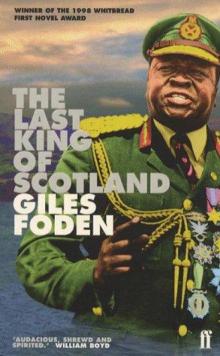 The Last King of Scotland (1998)
The Last King of Scotland (1998)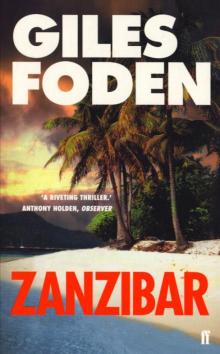 Zanzibar
Zanzibar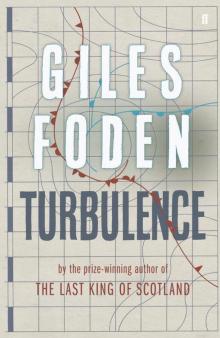 Turbulence
Turbulence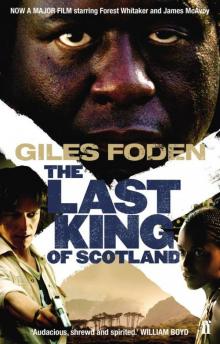 The Last King of Scotland
The Last King of Scotland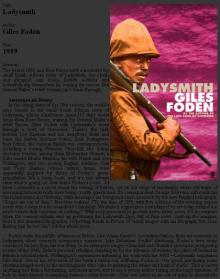 1999 - Ladysmith
1999 - Ladysmith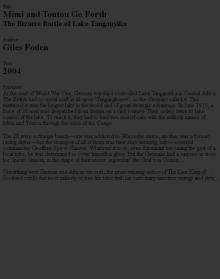 2004 - Mimi and Toutou Go Forth
2004 - Mimi and Toutou Go Forth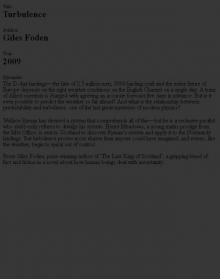 2009 - Turbulence
2009 - Turbulence